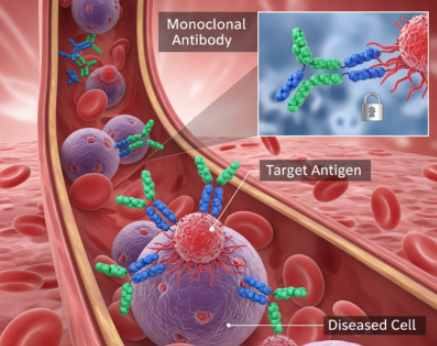Role of Targeted Monoclonal Antibody Therapy in Autoimmune Disease Treatment
- Updated on: Oct 31, 2025
- 3 min Read
- Published on Oct 31, 2025

Role of Targeted Monoclonal Antibody Therapy in Autoimmune Disease Treatment
The immune system is the defence system of our body. It protects our bodies from infections by identifying and destroying harmful invaders, such as bacteria, viruses, and abnormal cells.
However, genetic mutations, exposure to a toxic environment, hormonal changes, poor lifestyle choices, and other factors can lead to immune system malfunction. As a result, our body’s own immune system mistakenly attacks its own healthy cells and tissues. This further leads to inflammation, tissue damage, and organ dysfunction. This condition is known as an autoimmune disease.
Common examples of autoimmune diseases are:
- Rheumatoid Arthritis
- Lupus
- Multiple Sclerosis
- Type 1 Diabetes
- Psoriasis
Its symptoms can vary depending on the affected tissue or organ and can range from joint pain and fatigue to skin rashes and neurological problems.
Traditionally, clinicians rely on treatments, such as corticosteroids and immunosuppressants, to reduce immune activity. However, these treatments affect the entire immune system.
This can lead to:
- Increased susceptibility to infections
- Generalized immune suppression
- Long-term side effects such as weight gain, osteoporosis, or high blood pressure
So, nowadays, researchers and clinicians have turned to more targeted approaches, such as monoclonal antibody therapy.
What is Targeted Monoclonal Antibody Therapy?
Monoclonal antibodies are a homogeneous mixture of identical antibody molecules. These antibodies act like natural antibodies in the body. They are designed to bind to the same specific epitope on a target molecule.
So, these antibodies are used to treat autoimmune diseases. Unlike general immunosuppressive drugs, mAbs specifically block specific pathways or immune cells responsible for triggering the autoimmune reaction. This makes them more precise, effective, and safer for long-term treatment.
For example, the Mouse NME2 monoclonal antibody is developed from mouse immune cells. It is used in research to study protein functions and signaling pathways related to immune responses.
This level of precision makes monoclonal antibodies an effective and safer approach to managing autoimmune conditions such as rheumatoid arthritis, lupus, psoriasis, and multiple sclerosis.
How Monoclonal Antibody Therapy Helps in Autoimmune Disease Treatment?
Block Immune Pathways
In autoimmune diseases, certain molecules like cytokines or immune receptors become overactive, causing inflammation and tissue damage.
Note: Cytokines are signaling proteins that tell immune cells to attack. Immune receptors are proteins on cell surfaces that activate immune responses.
Monoclonal antibodies can bind specifically to these molecules and block their activity.
For example:
- Anti-TNF antibodies like Infliximab block tumor necrosis factor-alpha (TNF-α), a key molecule that drives inflammation in rheumatoid arthritis and Crohn’s disease.
- Anti-IL-6 antibodies like Tocilizumab block interleukin-6, which reduces inflammation in conditions like lupus or RA.
By selectively blocking these immune pathways, mAbs calm the immune system’s overactivity without completely suppressing its ability to fight infections. This precision reduces side effects compared to traditional immunosuppressants.
Reduction of Harmful Immune Cells
Some autoimmune diseases are driven by specific immune cells, such as B cells or T cells – these cells mistakenly attack healthy tissues. However, mAbs target these cells directly and reduce their numbers or activity. As a result, this prevents the production of autoantibodies that attack the body’s own tissues.
This also ensures that only disease-causing cells are affected and the rest of the immune system remains intact.
Block Immune Cell Movement
In some autoimmune conditions, immune cells migrate to specific organs and cause inflammation. However, monoclonal antibodies can prevent these cells from reaching their targets.
For example:
Natalizumab is used in multiple sclerosis. It blocks immune cells from crossing the blood-brain barrier. As a result, it prevents them from attacking nerve cells in the brain and spinal cord.
This mechanism reduces tissue damage and helps maintain normal immune activity elsewhere in the body.
Precision and Safety
Monoclonal antibody therapy has high specificity. Since mAbs are designed to act on specific molecules or cells, patients experience fewer side effects compared to broad immunosuppressive drugs.
Apart from this, patients often experience reduced inflammation, pain, and flare-ups. mAbs can prevent long-term organ or tissue damage.
The Bottom Line
Now that you know the role of mAbs in autoimmune disease treatment, what are you waiting for? Find a reliable supplier to buy high-quality mAbs and start your research now!












